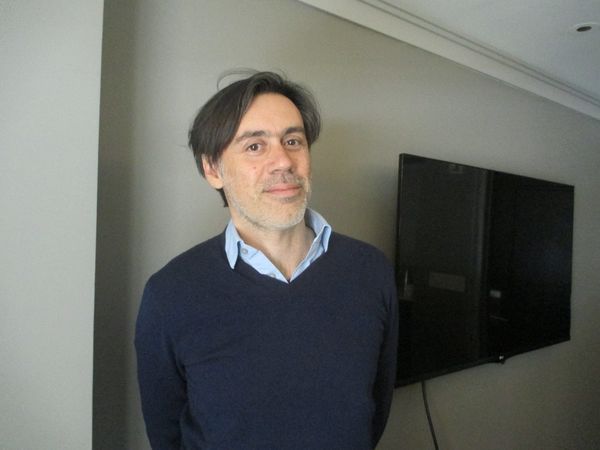Cécile de France, who has one of the most charismatic smiles in French cinema, shines as Madame de La Pommeraye in Lady J (Mademoiselle De Joncquières aka The Art Of Seduction), Emmanuel Mouret's fresh take on an episode from Diderot's Jacques the Fatalist, the same one Robert Bresson so brilliantly turned into his 1945 film Les dames Du Bois De Boulogne.
 |
| Madame de Joncquières (Natalia Dontcheva) with Madame de La Pommeraye (Cécile de France) and Mademoiselle de Joncquières (Alice Isaaz) with the Marquis des Arcis (Edouard Baer) |
In particular the scenes with her friend, Lucienne (played beautifully by Laure Calamy), are a standout of acting on at least three levels. Their conversations function like a palimpsest, questioning with the slightest winks, Diderot's plot, its current incarnation and what both imply about female friendship. The Marquis des Arcis (Edouard Baer) can only scratch the surface, his smile remaining that of the born yesterday toxic masculinity.
De France gives her Madame de La Pommeraye a quickness and ease of deception, that is, in an elegant subtle way, very 21st century. The smile comes easily, the strain is still visible, but the façade has to be held up while powerful feelings of love and despair, unspoken, reinforce the loneliness.
Before the Rendez-Vous With French Cinema luncheon in New York, Emmanuel Mouret started out by sharing with me his approach to Diderot and why he added a confidante character in his film.
Anne-Katrin Titze: You just came from MoMA?
Emmanuel Mouret: Yes, yes. I just looked at the permanent collection because it was a short time.
AKT: The decision to make a film about Diderot's work, and to use this particular episode that Bresson also did in Les Dames du Bois de Boulogne is quite brave. Why this episode?
EM: At the start it was the idea of my producer [Frédéric Niedermayer, executive producer of Jean-Paul Civeyrac's A Paris Education] that I do a costume film. And I immediately thought about that passage of Diderot's novel that I read many many years ago and that I re-read often afterwards. Of course I was apprehensive because Bresson had made an adaptation but I said to myself that adapting it and situating it in the period in which it was written, I was bringing in a new idea.
Also Diderot was very attached to the character of Mademoiselle de Joncquières and I had the same attachment but in a different way, so I brought in a new idea. In Diderot's novel, Jacques the Fatalist, it is an innkeeper who tells the story and it's very short, maybe 20 pages. So it's very possible to add your own personal developments.
AKT: Yes, very much so.
EM: What was very exciting in this adaptation was that it seemed very modern to me. Actually it's the definition of all the great classics - something stays classic when it can be modern as well. And apart from Les Liaisons Dangereuses, there are very few films that are interested in this period of the Seventies [1770s, that is, of course]. There are many films on the Revolution but very few on the years before.
 |
| Emmanuel Mouret on the Marquis des Arcis (Edouard Baer) with Madame de La Pommeraye (Cécile de France): "He is not clever like the Marquise." |
AKT: Madame and Mademoiselle de Joncquières live under terrible conditions in horrible unhappiness in the beginning. The description of how they live before Madame de La Pommeraye takes them out of the brothel is given, but you don't show it on screen. The camera stays outside. I appreciated that choice. I don't actually know if it makes it worse or less so. It's in our heads, the horror. Can you talk about that decision?
EM: Of course I thought very much about what would be shown. And I agree with you that cinema exists within the imagination of the audience. And often things exist better in the imagination than what is shown. For me it would have been too demonstrative if I had shown something.
AKT: I liked the way you were depicting the friendship between the two women [Madame de La Pommeraye and Lucienne] with their smiles. Especially Cécile de France, who has one of the greatest smiles in French cinema. They talk in code and it's very nuanced, their conversation. I liked that combination very much.
EM: The character of Madame de La Pommeraye's friend is an invention. She is not part of Diderot's story. I needed a character that allowed me to go inside the thoughts of Madame de La Pommeraye, something like the confidante in classical theatre. But writing it I noticed that this confidante character represented the position of the audience. It's measured. She tries to bring her friend to reason.
 |
| Marquis des Arcis (Edouard Baer) with Mademoiselle de Joncquières (Alice Isaaz): "Yes, he is a bit like a bear, as you said." |
And little by little she sees her friend wander off a bit like a boat and not be able to bring her back to reason. That reminded me of situations we have in life when you're very close to somebody and then you see them just wander off.
AKT: And the code of smiles?
EM: It's a societal code of savoir vivre. Of course the audience arrives to read what's behind those smiles.
AKT: Because you have good actors who can signal many things at once. Some of the visuals are very striking. The green of the sofa being the same as Cécile de France's eyes in one scene. And the costumes [by Pierre-Jean Larroque] just won the César.
EM: All the costumes were made especially for the film. And as the costumes and the decor were being designed at the same time, I insisted particularly on two things. On the silhouette, that's why we have costumes that are not overcharged and also on very simple sets so that the sets could be a bit like a screen for the silhouettes.
That's why we worked the colours of the costumes in accordance with the furniture and set colours. Contrary to some costume films of that time, we tried to show the modernity within that period. We tried to avoid things that would make it look old and faded and brown.
 |
| Madame de La Pommeraye (Cécile de France) with Marquis des Arcis (Edouard Baer): "For me she's a character I wanted to defend ..." |
AKT: This week in The New Yorker magazine there was an article about two new books on Diderot coming out. One, I believe, more on the Encyclopedia, the other one focusing on Catherine the Great. The article asks about the reception of Diderot now, in academia and beyond. And you were just talking about the modernity and how much you feel he is of the now. How so?
EM: What I think is interesting about Diderot is that he is someone who is always criticizing and asking questions. He never stops on a definitive opinion. And even when he himself has an opinion on something he puts it in question. It's a thought that is always evolving, moving.
And what's beautiful in that story is that the audience can often make a mistake on the characters. After seeing the film, obviously the subject of the film is love. But what opinion can one have of love? It's something that can be fantastic as well as diabolical. However I think that Diderot loves love. Because love creates movement. But he also knows well that love can create the worst injuries.
AKT: The injuries are shown so well in this story. Madame de La Pommeraye is trying to defend herself when she pokes at him [the Marquis] to say he is bored, by pretending that she herself is bored. It's a defence mechanism that results in terrible hurt.
 |
| Marquis des Arcis (Edouard Baer) with Madame de La Pommeraye (Cécile de France): "I think we can see ourselves in Madame de La Pommeraye. But she goes farther than we would." |
EM: For me she's a character I wanted to defend, that is beautiful, more beautiful than the one the innkeeper was describing in Diderot's story. And of course as audience you are in a delicate position with Madame de La Pommeraye because we have empathy for her.
We understand what it is to suffer because of love. And at the same time she does atrocious things. At the same time she tries to save her conscience. And I think we can see ourselves in Madame de La Pommeraye. But she goes farther than we would.
AKT: I hope so.
EM: Because she realizes a phantasm - and we don't - which is vengeance. Of course there is something immoral about vengeance but she does it with so much genius that we can actually admire it.
AKT: Totally.
EM: There are many different colours there.
AKT: And the Marquis, sometimes he is like a bear. Who doesn't understand.
EM: Yes.
 |
| Lady J (Mademoiselle De Joncquières) director/screenwriter Emmanuel Mouret with Anne-Katrin Titze: "I agree with you that cinema exists within the imagination of the audience." |
AKT: It's not just that he is naïve. There's also a bit of, to put it in 21st century terms, toxic masculinity?
EM: Yes. I found that character of the Marquis fascinating and very different from a Valmont or a Don Juan. Because he is sincere. He is a real libertine. He doesn't hide his inconsistency because that's what he is feeling. He listens to the nature in himself in a way.
AKT: And everybody else has to listen to it too.
EM: At the same time he just follows his desire blindly and extremely. If he wants somebody, he's ready to put everything in place to get what he wants. But he is not clever like the Marquise. Yes, he is a bit like a bear, as you said. Something that's very moving for me in that story is that at the end, out of his honesty, he is ready to accept for a wife somebody that in this society would be totally unacceptable. And that's an admirable gesture.
AKT: He says "By taking revenge, she did me a favour."
EM: That's the spirit of Diderot. In his mindset there's always movement, as well as paradox.
AKT: Another costume drama coming up for you?
EM: No, I'm preparing two contemporary films that I hope will be rich in paradox. And I have a farther project for another costume film.
AKT: You are good at them. I love costume dramas with paradox.
EM: Thank you.
Read what Serge Toubiana had to say on Diderot, Bresson, Rivette and Lady J aka Mademoiselle De Joncquières.
Lady J aka Mademoiselle De Joncquières will be available on Netflix starting March 8.
The uniFrance and Film Society of Lincoln Center's 24th edition of Rendez-Vous with French Cinema in New York, runs through March 10. Screenings will take place at the Walter Reade Theater, Lincoln Center.























